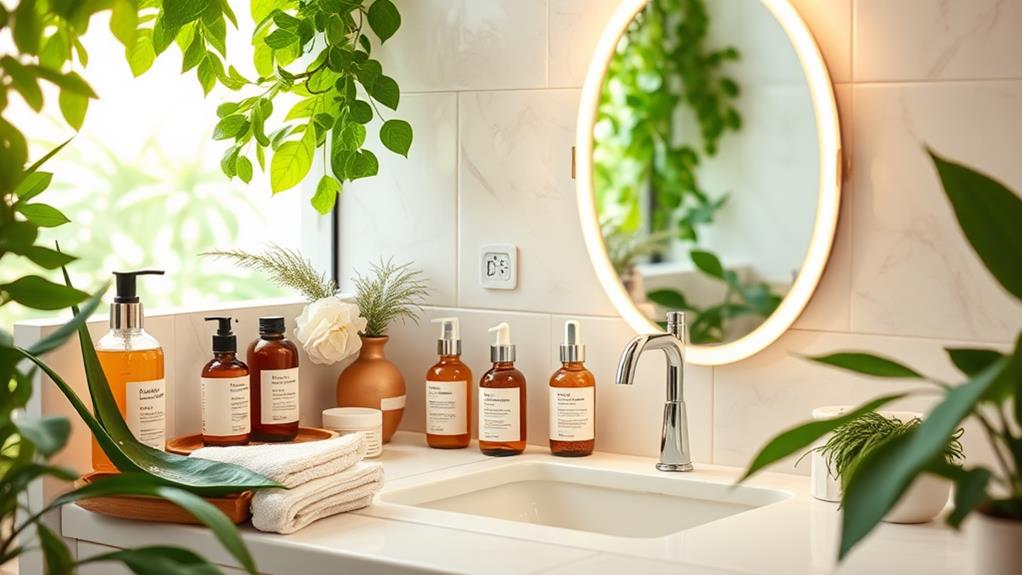When it comes to achieving healthy and great skin, it's not just about slathering on products; it's about adopting a holistic approach that encompasses hydration, nutrition, and consistent care. You might be surprised to learn that simple daily practices can make a significant difference in your skin's appearance and health. From the importance of a good cleansing routine to the benefits of regular professional treatments, there's much to reflect upon. So, what are the essential practices you might be overlooking that could transform your skincare regimen?
Stay Hydrated
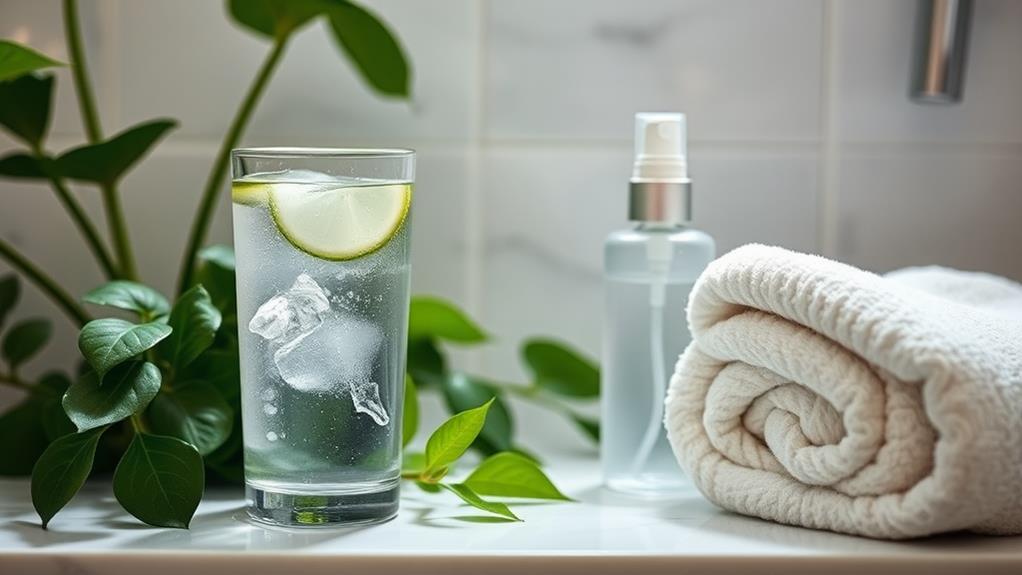
Staying hydrated is essential for maintaining healthy skin. When you drink enough water, your skin feels plumper and looks brighter. Think of it like watering a plant; without enough water, it wilts and gets sad. Your skin's the same way!
So, how much water should you drink? Aim for about eight glasses a day, but your body might need more if you're active or it's really hot outside.
You might be shocked to learn that coffee and soda don't count as hydration. They can actually dehydrate you! Instead, try to stick with good ol' water, herbal teas, or even fruits and veggies with high water content, like cucumbers and watermelon.
If you're ever feeling tired or cranky, it could be a sign you're not drinking enough. Hydration can help with that too! Plus, when your skin's well-hydrated, it can better fight off dryness and irritation.
Use Sunscreen Daily
Drinking enough water keeps your skin hydrated, but protection from the sun is just as important. Sunscreen isn't just for beach days; it's a daily essential. Whether it's sunny, cloudy, or even raining, those harmful UV rays are still out there, ready to wreak havoc on your skin. So, slather on that sunscreen every morning!
Look for a broad-spectrum sunscreen with at least SPF 30. This means it protects against both UVA and UVB rays, which can cause sunburn and skin aging. Don't forget to apply it generously on all exposed skin, including your face, neck, and ears.
If you're planning to be outside for a while, reapply every two hours—or more often if you're swimming or sweating.
And here's a fun tip: pick a sunscreen you like! Whether it's a lotion, spray, or gel, finding one that feels good on your skin will make daily application a breeze. Think of it as a superhero cape for your skin, fighting off the bad guys!
With this simple habit, you're not just protecting yourself from sunburn; you're also preventing long-term skin damage. Your future self will thank you!
Cleanse Your Face
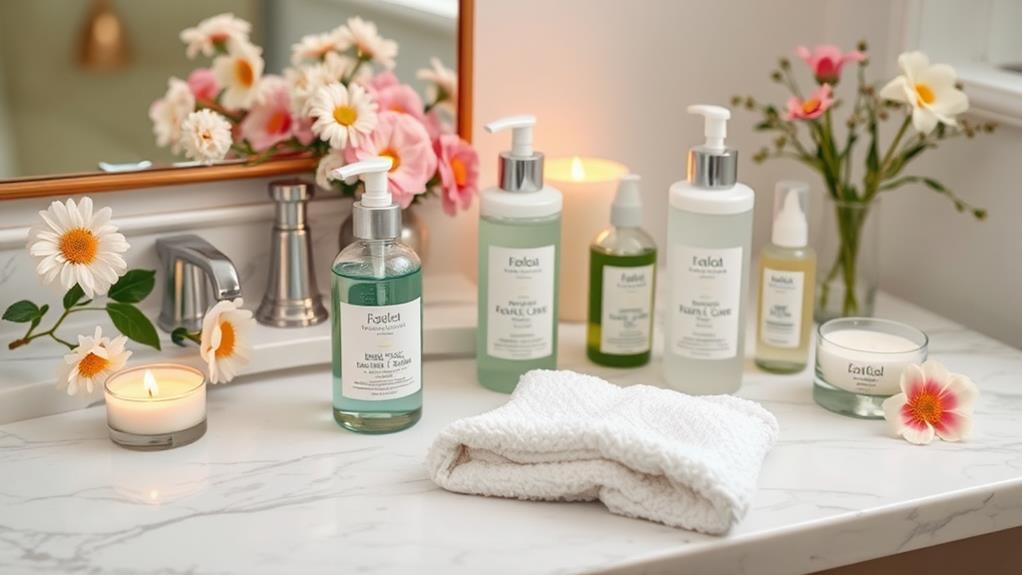
Cleansing your face is essential for maintaining healthy skin, and it's a step you shouldn't skip. Think of it as giving your skin a revitalizing drink after a long day. When you cleanse, you wash away dirt, oil, and makeup that can clog your pores and lead to breakouts. You wouldn't want to sleep with a dirty face, right? It's like going to bed with your shoes on—just not cool!
Choose a gentle cleanser that suits your skin type. If you have oily skin, you might prefer a foaming cleanser, while dry skin loves something creamy and hydrating.
Splash your face with warm water, apply your cleanser, and massage it in gently for about a minute. Don't rush! This is your time to shine—or rather, to cleanse. Rinse thoroughly and pat your face dry with a clean towel.
Make it a habit to cleanse twice a day, morning and night. Trust me, your skin will thank you! If you stick to this routine, you'll notice how fresh and bright your skin looks.
Exfoliate Regularly
Exfoliating regularly is an essential step in your skincare routine that helps slough away dead skin cells, revealing the fresh, radiant skin underneath.
Think of it as giving your skin a mini makeover! When you exfoliate, you're not just removing the old stuff; you're also helping your skin absorb the good stuff, like moisturizers and serums, even better.
Now, you might wonder how often you should exfoliate. For most people, doing it 1-3 times a week is perfect. If you've got sensitive skin, you might want to stick to once a week.
There are two main types of exfoliators: physical and chemical. Physical exfoliators, like scrubs, use tiny bits to buff away the dead skin. Chemical exfoliators, on the other hand, use acids to dissolve dead skin. Both can be effective, so choose what feels best for you!
Don't forget to be gentle! Scrubbing too hard can irritate your skin, and nobody wants that.
Moisturize Appropriately
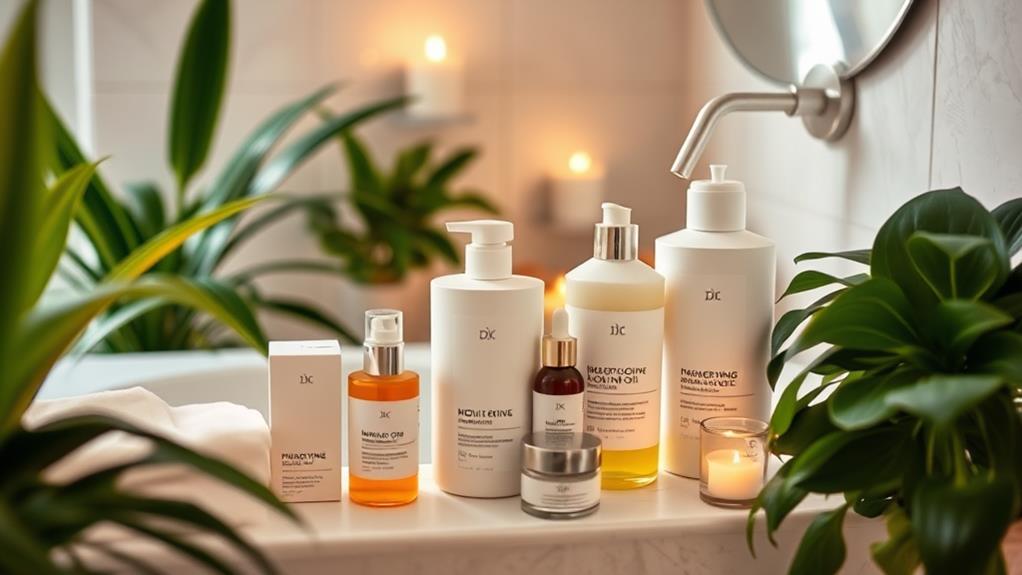
After you've exfoliated, it's time to lock in that fresh, rejuvenated skin with the right moisturizer. Think of moisturizing like giving your skin a big, cozy hug. It helps to keep all that lovely moisture in and makes your skin feel soft and smooth.
But how do you choose the right one?
First, consider your skin type. If you have oily skin, you might want a lightweight gel or lotion that won't feel heavy. For dry skin, a cream with rich ingredients like shea butter or hyaluronic acid can do wonders. Don't forget to check for any fragrances or irritants that could make your skin go "Yikes!"
Next, apply your moisturizer right after washing your face or showering. This helps trap the moisture in your skin. Remember, a little goes a long way! You don't want to look like you just jumped into a swimming pool.
Eat a Balanced Diet
Eating a balanced diet is essential for maintaining healthy skin. When you fill your plate with a variety of foods, you give your skin the nutrients it craves. Think of your body as a car; if you put in the right fuel, it runs smoothly, but if you fill it with junk, well, you might end up on the side of the road!
Include plenty of fruits and veggies in your diet. They're packed with vitamins and minerals that help your skin glow. Foods rich in omega-3 fatty acids, like fish and walnuts, can keep your skin hydrated and reduce inflammation.
Don't forget whole grains, either! They provide fiber, which helps with digestion and keeps your skin looking fresh.
You should also drink lots of water. Staying hydrated is key for plump, youthful skin. So, swap that soda for a glass of water, and your skin will thank you!
In short, a balanced diet is like a superhero for your skin. When you nourish your body with the right foods, you'll notice a big difference in how your skin looks and feels. So, dig in and enjoy those healthy meals!
Incorporate Antioxidants

Adding antioxidants to your skincare routine can greatly enhance your skin's health. These little superheroes help fight off free radicals, which can damage your skin and make it look tired. You'll find antioxidants in many products, from serums to creams, so you've got plenty of options!
Vitamin C is a fan favorite; it brightens your skin and evens out your tone. Then there's Vitamin E, which loves to moisturize and soothe. If you're into natural remedies, consider using green tea or pomegranate extract. They're packed with antioxidants too!
When you apply these products, you're not just slapping on some lotion. You're giving your skin a shield against pollution and sun damage. It's like sending your skin to a superhero training camp!
But remember, consistency is key. You won't see results overnight, but stick with it, and your skin will thank you.
Think of antioxidants as a daily snack for your skin, keeping it nourished and happy. So go ahead, explore your options, and find the perfect antioxidant to add that extra boost to your skincare game! Your future self will appreciate it.
Get Enough Sleep
Getting enough sleep is essential for maintaining healthy skin. When you catch those Z's, your body works hard to repair and rejuvenate itself. You mightn't realize it, but while you're dreaming, your skin is busy fighting off damage from the day. Lack of sleep can lead to dull skin, dark circles, and even breakouts. No one wants that!
Aim for about 7 to 9 hours of sleep each night. You can try setting a regular bedtime and creating a calming bedtime routine. Maybe read a book, listen to music, or even meditate. Whatever helps you unwind!
Also, make sure your sleep environment is cozy and dark—think soft pillows and a cool room temperature.
And hey, if you're someone who loves scrolling through your phone late at night, it might be time to put it down. The blue light from screens can mess with your sleep cycle.
Manage Stress Levels

Stress is like a sneaky villain when it comes to your skin's health. When you're stressed, your body releases hormones like cortisol, which can lead to breakouts, dryness, and even premature aging. Yikes!
But don't worry; there are ways to kick that villain to the curb.
First, try to identify what's causing your stress. Is it school, family, or maybe too many video games? Once you know, you can tackle it head-on.
Regular exercise is a great stress-buster. Whether it's running, dancing, or just jumping around your room, getting your body moving can help clear your mind and boost your mood.
Mindfulness and deep breathing are also super helpful. Just a few minutes of focused breathing can work wonders.
Picture yourself at the beach, or imagine you're a superhero saving the day—whatever helps you relax!
Avoid Smoking
While managing stress is essential for healthy skin, avoiding smoking is equally important. You might already know that smoking isn't good for your health, but did you realize it can mess with your skin, too?
When you smoke, it reduces blood flow, which means your skin doesn't get the nutrients and oxygen it needs. This can lead to a dull complexion and make you look older than you are.
Plus, the chemicals in cigarettes can break down collagen and elastin, the building blocks of healthy skin. That's why smokers often have wrinkles and sagging skin. Not exactly the look you're aiming for, right?
If you're trying to kick the habit, remember, every little step counts! You can start by finding alternatives, like chewing gum or eating a healthy snack when cravings hit.
Surround yourself with supportive friends who encourage your journey.
And hey, think of all the extra money you'll save for that fancy skincare product you've been eyeing!
Limit Alcohol Intake
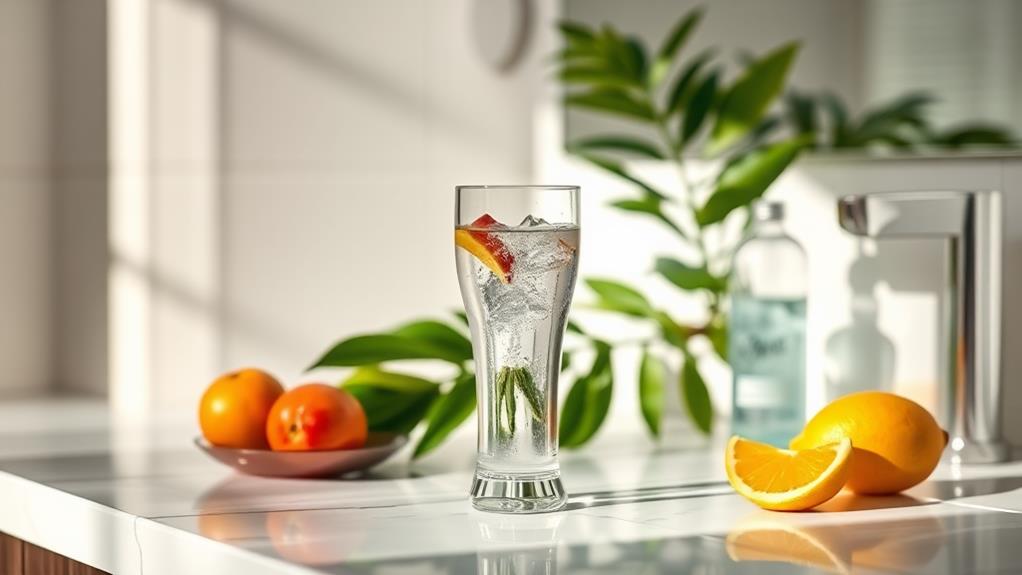
Limiting alcohol intake is essential for maintaining healthy skin. You might enjoy that glass of wine or cocktail now and then, but too much alcohol can cause your skin to become dehydrated. When your skin's thirsty, it can look dull and tired, and nobody wants that!
Alcohol can also mess with your skin's natural barrier. This might lead to breakouts, redness, or even puffiness, especially around the eyes. It's like inviting a party crasher to your skin's big bash!
So, how can you enjoy a drink while keeping your skin happy? Start by setting limits. Maybe you stick to one drink on weeknights and save the fun for weekends.
You can also switch to lighter options, like a spritzer, which has more water and less alcohol.
Don't forget to hydrate! Drinking water between your cocktails can help keep your skin plump and fresh. Your skin will thank you for it, and you might even wake up feeling better the next day!
Use Gentle Products
Many people overlook the importance of using gentle products for their skin. You might think that scrubbing away dirt and oil with harsh cleansers is the best way to achieve clear skin. But guess what? Your skin is more delicate than you realize! Using gentle products helps maintain its natural balance, keeping it happy and healthy.
Look for cleansers, moisturizers, and toners that are labeled as "gentle" or "sensitive." These products are usually free of harsh chemicals, fragrances, and dyes that can irritate your skin. It's like giving your face a soft hug instead of a rough shove!
When you use gentle products, you're not just avoiding irritation; you're also allowing your skin to breathe and repair itself. Plus, if you have specific concerns like acne or dryness, gentle products can still be effective without being too harsh.
Practice Good Hygiene
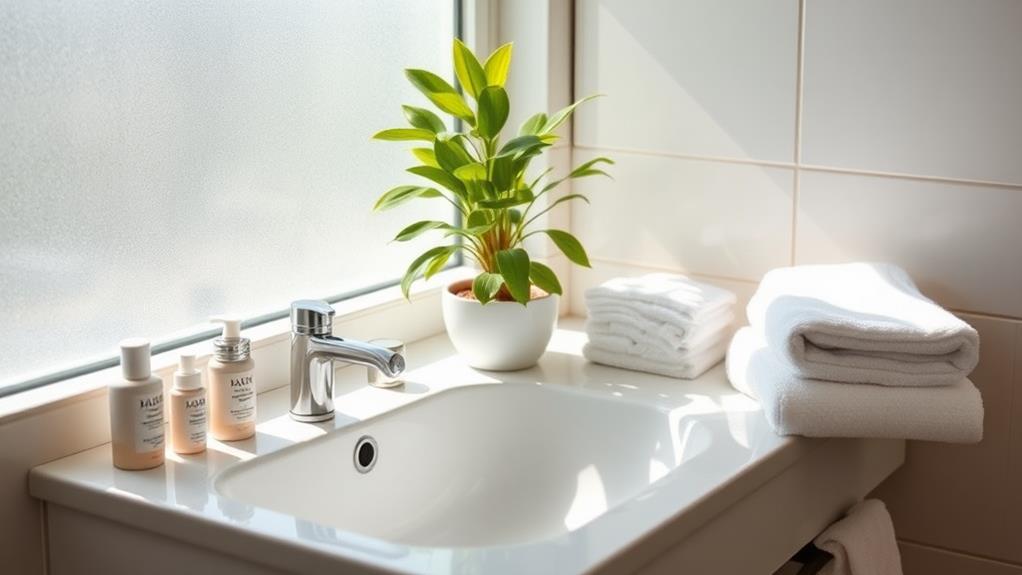
Practicing good hygiene is essential for maintaining healthy skin. It's not just about looking good; it's about feeling good too!
First things first, wash your face twice a day. Use a gentle cleanser that suits your skin type. This helps remove dirt, oil, and pesky bacteria that can cause breakouts. Don't forget to clean your hands regularly, especially before touching your face. You wouldn't want to transfer all those germs, right?
Another important step is to keep your hair clean. Oily hair can lead to clogged pores, which isn't fun for your skin. And if you're sweating, showering after your workout is a must. Your skin will thank you for it!
Also, change your pillowcases often; they can collect oils and dirt that may end up on your face while you sleep.
Stay Active
Staying active is essential for maintaining not just your physical health, but also the health of your skin. When you exercise, your heart pumps faster, and that means more blood flows to your skin. This helps deliver important nutrients and oxygen, making your skin glow—who doesn't want that?
Plus, sweating can help clear out those pesky pores, removing dirt and oil build-up.
You don't have to hit the gym for hours on end. Simple activities like walking your dog, dancing to your favorite songs, or playing tag with friends can do wonders. Aim for at least 30 minutes of activity most days, and trust me, your skin will thank you!
And let's not forget about stress—exercise is a fantastic stress-buster. When you're less stressed, your skin gets to chill too. Nobody wants to deal with breakouts from stress, right?
Avoid Touching Your Face
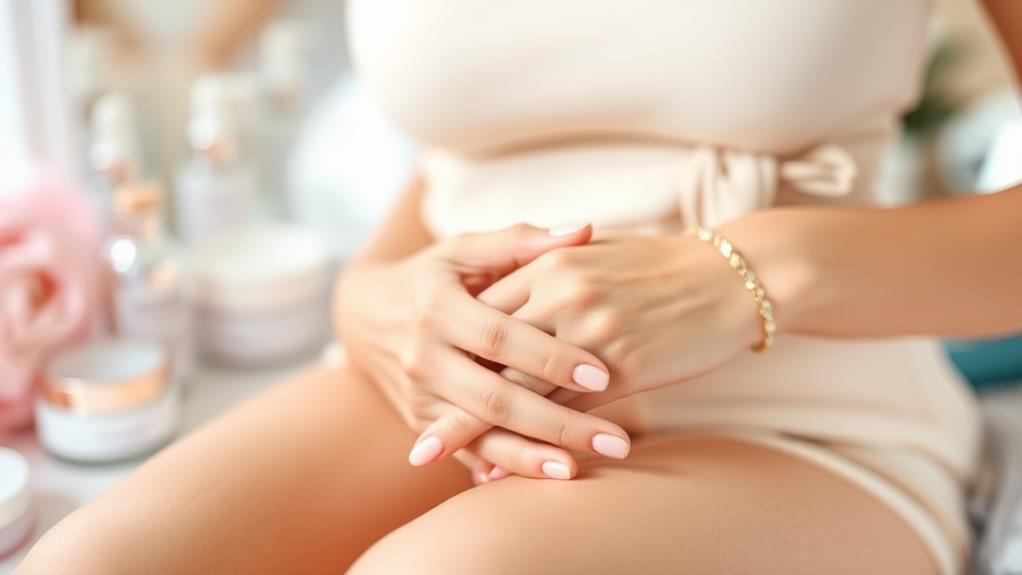
After keeping your body active, it's time to focus on another key aspect of skin health: avoiding the urge to touch your face. It might sound easy, but let's be real—our hands can't resist the call of our cheeks, nose, and chin! Every time you touch your face, you're introducing germs, dirt, and oils that can lead to breakouts or irritation. Yikes!
Try to stay aware of your hands. If you catch yourself reaching for your face, gently redirect that hand. You could squeeze a stress ball or fidget with a pen instead. It's like giving your hands a new hobby!
Also, think about how often you rest your chin in your hand while deep in thought. That's another face-touching trap! By keeping your hands busy, you'll break the habit more easily.
Lastly, remember to keep your skin clean. Wash your hands regularly to avoid transferring any sneaky germs to your face when you do accidentally touch it. Your skin will thank you, and you might just find it's easier to resist that face-touching urge.
Keep your hands off, and your skin will glow!
Use a Humidifier
A humidifier can be a game-changer for your skin, especially during dry months. When the air gets dry, it can suck the moisture right out of your skin, leaving it feeling tight and flaky. Yikes! That's where a humidifier comes in. By adding moisture back into the air, it helps keep your skin hydrated and happy.
Using a humidifier isn't just for winter, either. It can be beneficial year-round, particularly in places with low humidity. Just think of it as a cozy blanket for your skin, wrapping it in soothing moisture. You can place it in your bedroom while you sleep, ensuring you wake up with that fresh, dewy glow.
Remember to keep your humidifier clean, though! A dirty humidifier can spread germs and mold, which is the opposite of what you want for your skin. So, make it a habit to change the water daily and give it a good clean every week.
Incorporating this simple device into your routine can make a big difference. Trust me, your skin will thank you, and you might just feel a little more fabulous every day!
Incorporate Healthy Fats

Keeping your skin hydrated isn't just about the atmosphere; it also involves what you put into your body. One of the best ways to boost your skin health is by incorporating healthy fats into your diet. These aren't the greasy, unhealthy fats you might find in fast food. We're talking about good fats, like those in avocados, nuts, and olive oil.
These healthy fats help your skin retain moisture and can even improve its elasticity. So, when you snack on almonds or drizzle some olive oil on your salad, you're doing wonders for your skin!
Fish, especially salmon, is another fantastic source of omega-3 fatty acids, which can reduce inflammation and keep your skin looking vibrant.
But hey, don't go overboard! Moderation is key, even with good fats. Try to add them to your meals regularly, and soon enough, your skin will thank you.
And who wouldn't want that? So, next time you're at the grocery store, don't forget to pick up some of these healthy fats. Your skin will be glowing, and you'll feel pretty great, too!
Protect From Pollution
Pollution can wreak havoc on your skin, leading to premature aging and breakouts. When you step outside, you mightn't realize how much dirt, dust, and nasty chemicals are floating around. These pollutants can make your skin look dull and tired, and nobody wants that!
To protect your skin, start by washing your face regularly. Use a gentle cleanser to remove dirt and grime that can clog your pores. You should also consider using a good sunscreen, even on cloudy days, because UV rays can sneak through and do damage.
Another tip is to hydrate! Drinking plenty of water helps flush out toxins and keeps your skin looking fresh. Antioxidants, found in fruits and vegetables, are your skin's best friends. They fight off those nasty free radicals that pollution causes. So, munch on some colorful produce!
Lastly, don't forget to keep your living space clean. Regular dusting and vacuuming can keep airborne pollutants at bay.
Choose Non-Comedogenic Makeup
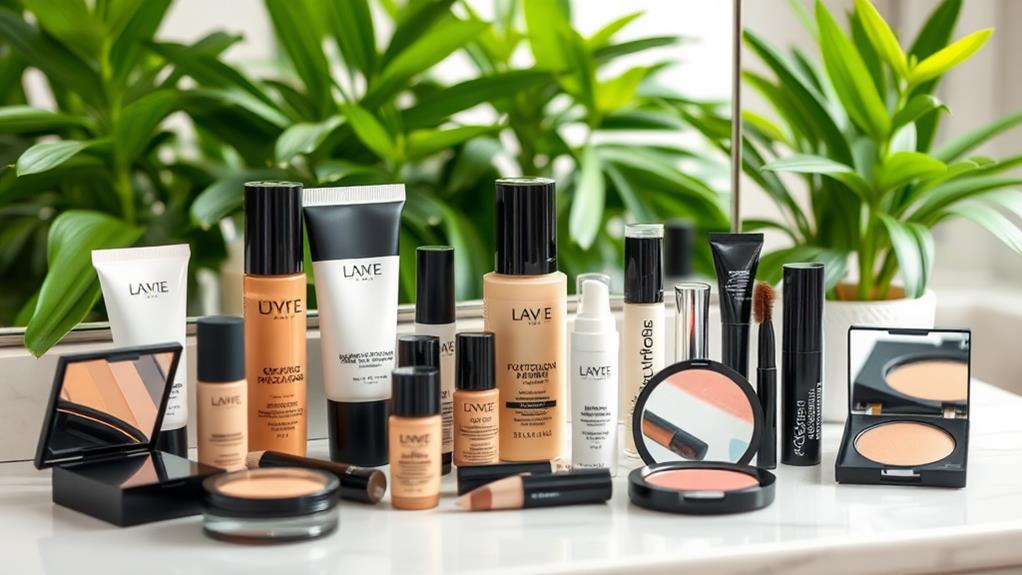
How can you guarantee your makeup won't contribute to breakouts or dull skin? The secret lies in choosing non-comedogenic makeup. Non-comedogenic products are specially designed not to clog your pores. When your pores stay clear, you're less likely to experience those pesky breakouts that can ruin your day.
When shopping for makeup, look for labels that say "non-comedogenic." This usually means the product won't cause acne. Whether it's foundation, concealer, or even blush, there are tons of options out there! You can still achieve a fabulous look without compromising your skin health.
It's also a great idea to pay attention to the ingredients. Some products are packed with oils or waxes that mightn't be the best for your skin type. If you're unsure, test a small amount on your skin first. This can help you avoid any unfortunate surprises!
Regularly Change Pillowcases
Changing your pillowcases regularly—ideally every week—can greatly impact your skin's health. Think about it: every night, your face rests on that fabric, soaking up oils, dirt, and sweat. Gross, right? If you don't switch them out, you're basically inviting breakouts and irritation to come party on your face!
When you sleep, your skin naturally sheds dead cells. If those cells stick around on your pillowcase, they can mix with oils and bacteria, creating the perfect recipe for unwanted zits. By changing your pillowcase often, you're giving your skin a clean place to rest, which helps it stay clear and fresh!
Plus, let's be real—there's nothing like the feeling of snuggling into a clean pillowcase. It's like giving your skin a little spa treatment every night.
If weekly changes feel like too much, aim for at least once every two weeks. You'll notice a difference in how your skin feels and looks, and you might even catch a better night's sleep.
Be Mindful of Ingredients
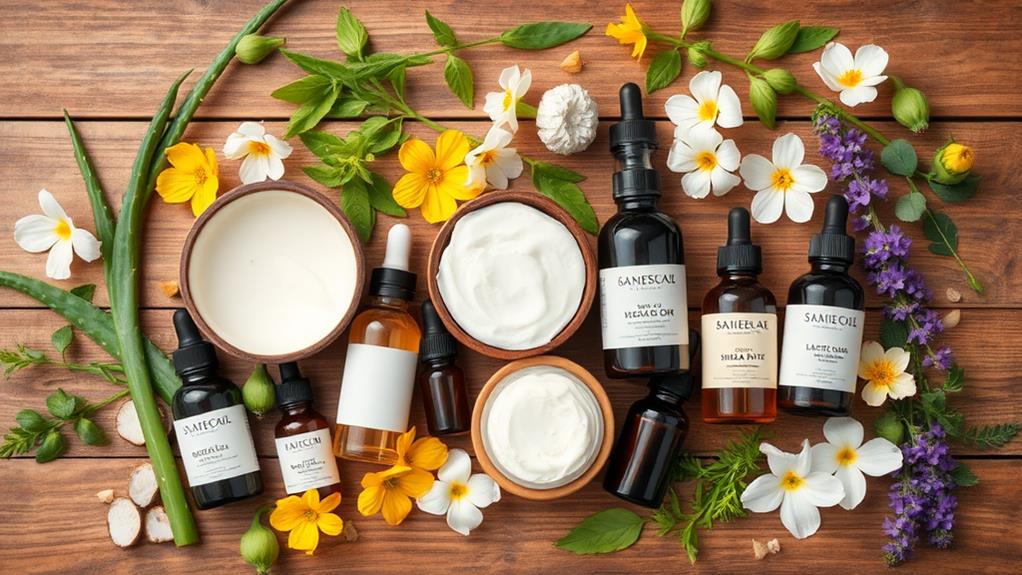
After ensuring your pillowcase is clean, it's time to pay attention to the products you apply to your skin. You mightn't realize it, but the ingredients in your skincare products can make a big difference.
So, what should you look for? First, try to stick with natural ingredients when possible. They're generally gentler and less likely to cause irritation.
Next, read labels like they're the latest gossip! If you see long, complicated names, that might be a red flag. Ingredients you can't pronounce often mean there are chemicals involved, which could be harsh on your skin.
Also, watch out for alcohol and fragrances, as they can dry your skin out or cause breakouts.
Lastly, everyone's skin is different. What works wonders for your friend mightn't work for you, so don't be afraid to experiment a little. Just remember, consistency is key!
Give your skin some time to adjust to new products. Knowing what's in your skincare can help you make better choices, leading to happier, healthier skin.
Try Face Masks
Face masks can be a game-changer in your skincare routine, offering a boost of hydration and nourishment that your skin craves. They're like a little spa day you can enjoy right at home!
Whether you're dealing with dryness, acne, or just want that radiant glow, there's a mask out there for you. You can choose from sheet masks, clay masks, or even DIY options with ingredients found in your kitchen.
When you apply a face mask, you give your skin a chance to really soak in all those good ingredients. It's a great way to relax too—just put on a mask, kick back, and let it work its magic.
Aim to use a mask once or twice a week, depending on your skin's needs. Just remember to read the instructions first; some masks need to stay on for a while, while others are quick and easy.
Regular Professional Treatments
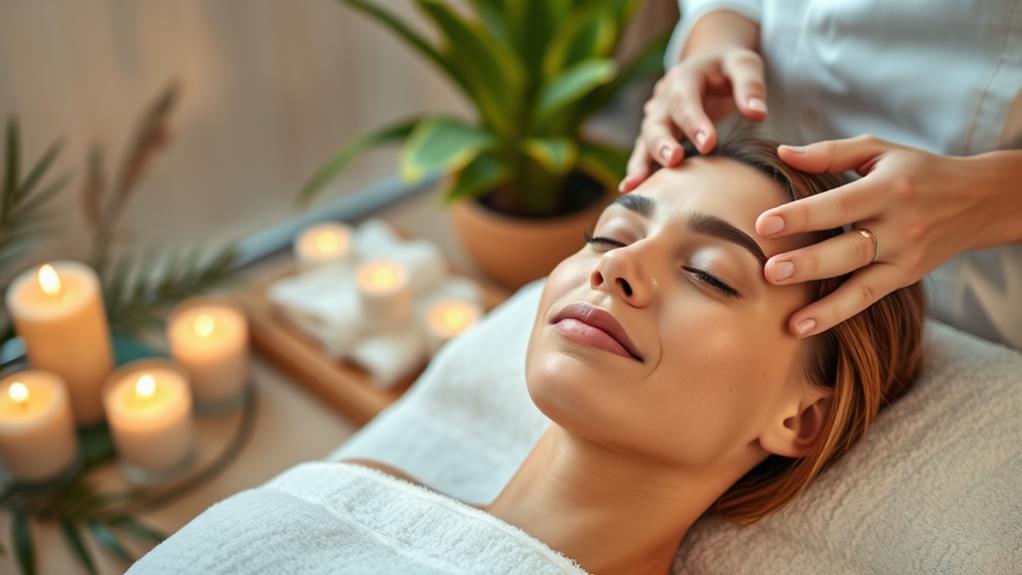
While at-home skincare routines are essential, incorporating regular professional treatments can take your skin to the next level. Think of it as giving your skin a special treat! These treatments, like facials, chemical peels, or microdermabrasion, can really boost your glow and tackle specific skin concerns.
When you visit a professional, they can assess your skin type and recommend treatments tailored just for you. They've access to products and equipment that you mightn't find at home, which can lead to fantastic results.
Plus, it's a great way to relax and take a break from your busy life—who doesn't love a little pampering?
Getting regular treatments helps keep your skin clear, hydrated, and youthful. It's like having a skincare coach guiding you on what your skin needs.
Just remember, consistency is key! You don't have to break the bank; even occasional treatments can make a difference.
Stay Consistent
To achieve healthy, radiant skin, consistency is essential. Think of your skincare routine like watering a plant. If you forget to water it, it wilts, right? The same goes for your skin. You've got to stick to your routine every day to see real results!
Start with simple practices, like cleansing and moisturizing. Do this morning and night, and you'll be amazed at how your skin responds. Remember, it's a marathon, not a sprint. You won't wake up overnight with glowing skin, but after a few weeks of dedication, you'll notice a change.
Don't get discouraged if you hit a bump in the road. Sometimes, life gets busy, and you might skip a step or two. That's okay! Just jump back in and keep going. Think of it as a dance—you might miss a beat, but the rhythm is still there.
Also, keep track of what products work best for you. This way, you can adjust your routine as needed. Staying consistent doesn't mean being perfect; it means making an effort to care for your skin every day.
Listen to Your Skin
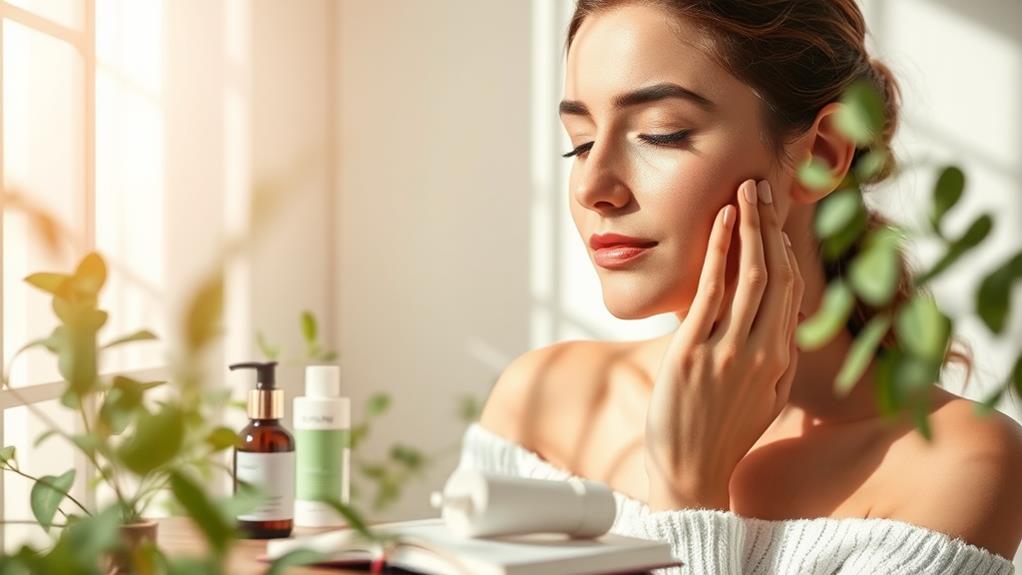
Even with a consistent skincare routine, tuning into what your skin needs is just as important. Your skin can be like a moody friend—it has its own feelings and tells you when something's off. So, pay attention! If it feels dry, maybe it's time to switch to a richer moisturizer. If it's breaking out, you might need to cut back on those greasy snacks or try a gentler cleanser.
It's all about listening. Check in with your skin daily. Is it red or irritated? That might mean you should ease up on the products you're using.
Sometimes, your skin might be begging for a break from makeup. Give it a chance to breathe!
And don't forget sunscreen; it's your skin's best friend. If you find yourself getting extra dry in winter, consider adding a humidifier to your room.
